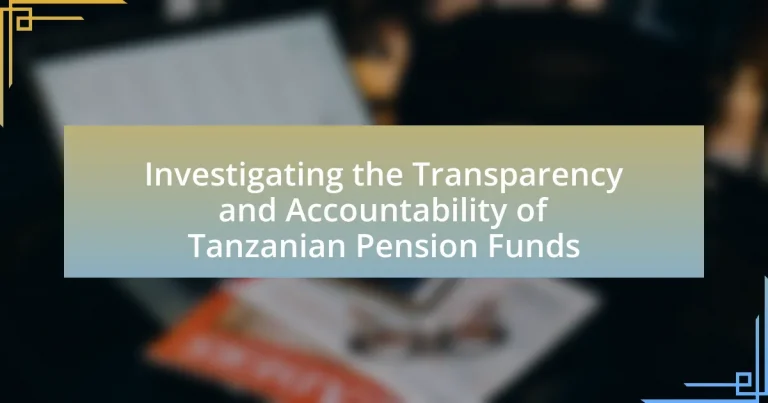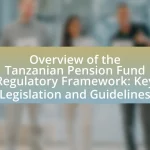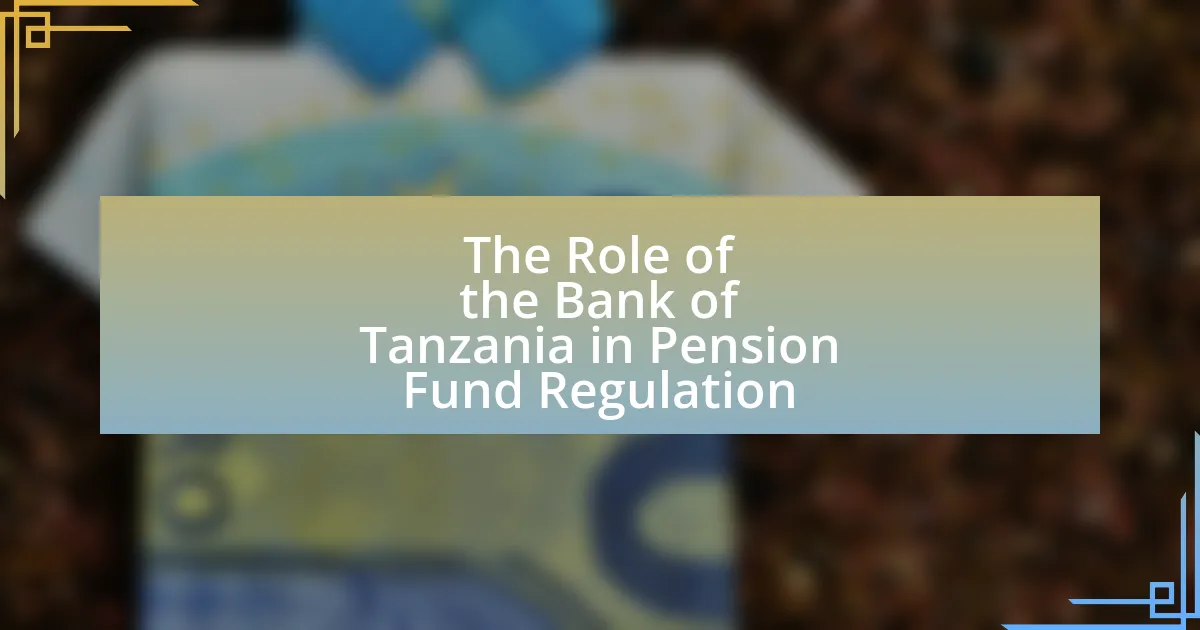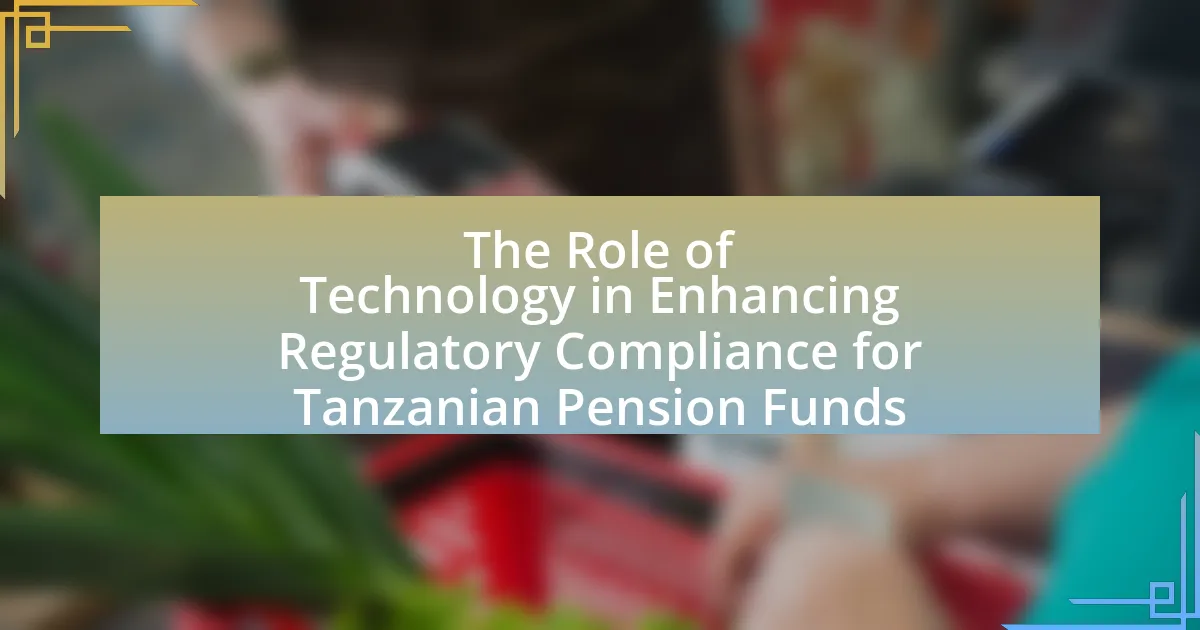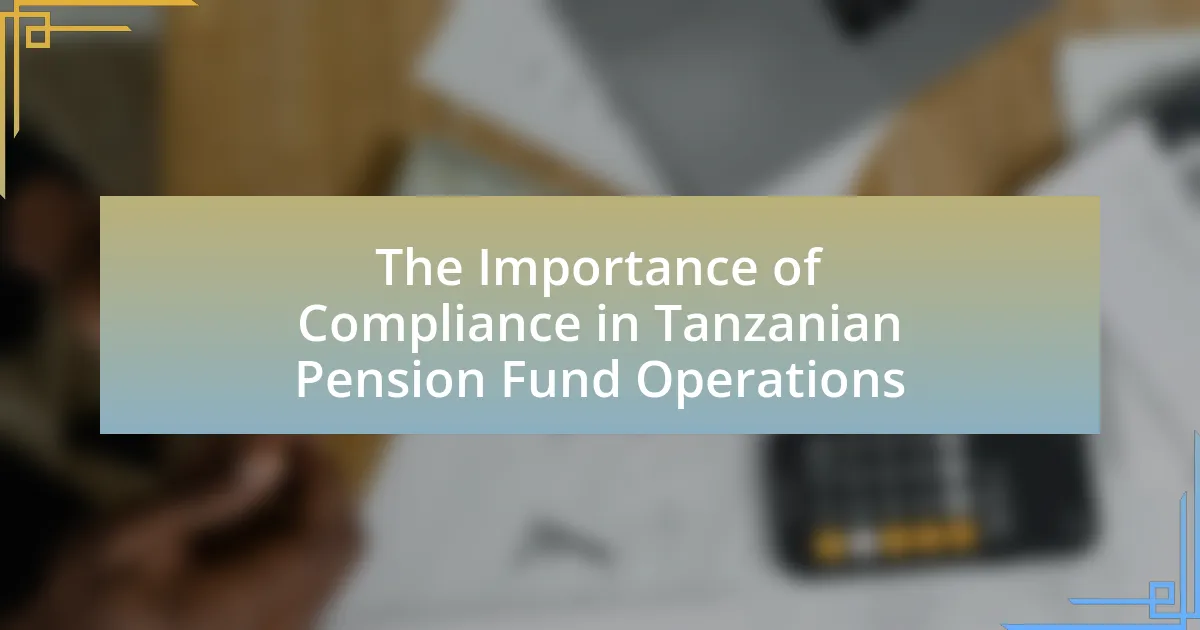The article investigates the current state of transparency and accountability in Tanzanian pension funds, highlighting significant challenges such as inadequate regulatory frameworks and limited public access to information. It defines transparency and accountability within the context of pension funds, emphasizing the importance of clear communication, regular reporting, and independent audits. The article also outlines existing governance frameworks, relevant laws, and the impact of international standards on pension fund operations. Additionally, it addresses barriers to transparency, the role of technology in enhancing accountability, and best practices for improving governance in the sector.
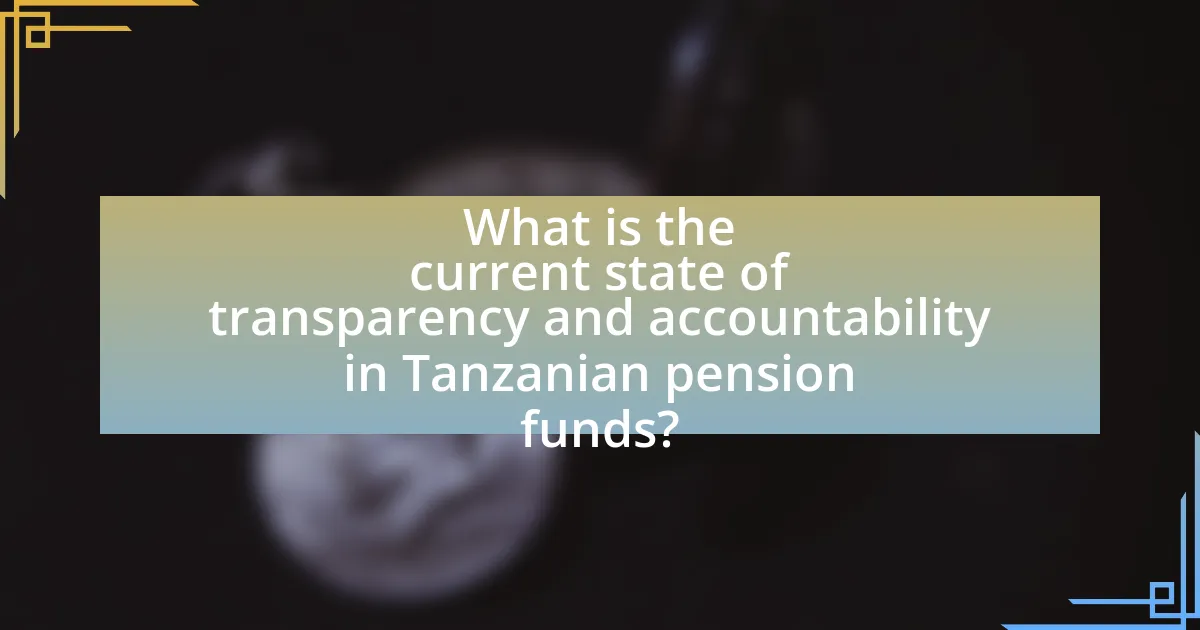
What is the current state of transparency and accountability in Tanzanian pension funds?
The current state of transparency and accountability in Tanzanian pension funds is characterized by significant challenges, including inadequate regulatory frameworks and limited public access to information. The National Social Security Fund (NSSF) and other pension schemes have faced criticism for not providing sufficient data on fund management and investment performance, which undermines stakeholder trust. Reports from the Bank of Tanzania indicate that only 30% of pension fund members are aware of their rights and benefits, highlighting a lack of effective communication and engagement. Additionally, the lack of independent audits and oversight mechanisms further exacerbates issues of accountability within these funds.
How are transparency and accountability defined in the context of pension funds?
Transparency in the context of pension funds refers to the clear and open communication of information regarding fund operations, investment strategies, and financial performance to stakeholders, including beneficiaries and regulators. Accountability, on the other hand, involves the obligation of pension fund managers to explain their decisions and actions, ensuring they are answerable for the management of the funds and the outcomes of their investment choices.
In Tanzania, the Pension Funds Act mandates that pension funds disclose financial statements and investment reports, promoting transparency. Additionally, the establishment of regulatory bodies, such as the Pension Funds Regulatory Authority, enforces accountability by requiring regular audits and compliance checks, ensuring that fund managers adhere to legal and ethical standards. This framework aims to protect the interests of beneficiaries and enhance trust in the pension system.
What are the key principles of transparency in pension fund management?
The key principles of transparency in pension fund management include clear communication, accessibility of information, accountability, and regular reporting. Clear communication ensures that stakeholders understand the fund’s objectives, strategies, and performance metrics. Accessibility of information allows stakeholders to easily obtain relevant data regarding fund operations and financial health. Accountability involves establishing mechanisms for oversight and ensuring that fund managers are answerable for their actions. Regular reporting, including financial statements and performance reviews, provides stakeholders with timely updates on fund status and compliance with regulations. These principles are essential for building trust and ensuring effective governance in pension fund management.
What are the essential elements of accountability for pension funds?
The essential elements of accountability for pension funds include transparency, governance, compliance, and performance measurement. Transparency ensures that stakeholders have access to relevant information regarding fund operations and financial status, which is crucial for informed decision-making. Governance involves establishing a framework of policies and procedures that guide the fund’s management, ensuring that fiduciary duties are met. Compliance refers to adherence to legal and regulatory requirements, which protects the interests of beneficiaries and maintains trust in the system. Performance measurement assesses the fund’s investment outcomes against benchmarks, providing insights into effectiveness and efficiency. These elements collectively foster trust and integrity in pension fund management, essential for safeguarding beneficiaries’ interests.
Why is transparency and accountability important for Tanzanian pension funds?
Transparency and accountability are crucial for Tanzanian pension funds because they ensure the proper management and safeguarding of contributors’ assets. These principles foster trust among stakeholders, including pensioners and government regulators, by providing clear information on fund operations, investment strategies, and financial performance. For instance, the National Social Security Fund (NSSF) in Tanzania has faced scrutiny over its investment decisions, highlighting the need for transparent reporting to prevent mismanagement and corruption. Furthermore, accountability mechanisms, such as regular audits and public disclosures, help to mitigate risks and enhance the overall stability of the pension system, ultimately protecting the financial well-being of retirees.
How does transparency impact stakeholder trust in pension funds?
Transparency significantly enhances stakeholder trust in pension funds by providing clear and accessible information regarding fund operations, investment strategies, and financial performance. When pension funds openly share data and decision-making processes, stakeholders, including members and regulators, feel more informed and confident about the management of their assets. Research indicates that higher levels of transparency correlate with increased stakeholder satisfaction and trust, as evidenced by a study published in the Journal of Pension Economics and Finance, which found that transparent communication practices lead to improved perceptions of fund reliability and accountability. This trust is crucial for the long-term sustainability of pension funds, as it fosters stronger relationships between fund managers and stakeholders, ultimately contributing to better fund performance and member engagement.
What role does accountability play in the effective management of pension funds?
Accountability is crucial in the effective management of pension funds as it ensures that fund managers are answerable for their investment decisions and financial practices. This accountability fosters trust among stakeholders, including beneficiaries and regulators, by promoting transparency in operations and decision-making processes. For instance, the Tanzanian pension fund sector has faced challenges related to mismanagement and lack of oversight, which accountability measures can help mitigate. By implementing strict reporting requirements and performance evaluations, pension funds can demonstrate their commitment to responsible management, thereby enhancing their credibility and safeguarding the interests of contributors.

What are the existing frameworks governing Tanzanian pension funds?
The existing frameworks governing Tanzanian pension funds include the National Pension Act of 2012, the Social Security Regulatory Authority (SSRA) Act of 2008, and various regulations issued by the SSRA. The National Pension Act establishes the legal foundation for pension schemes in Tanzania, outlining the rights and obligations of both fund managers and members. The SSRA Act provides the regulatory framework for overseeing pension funds, ensuring compliance with standards for transparency and accountability. Additionally, the SSRA issues guidelines and regulations that further define operational procedures and reporting requirements for pension funds, enhancing their governance and oversight.
What laws and regulations oversee pension fund operations in Tanzania?
The laws and regulations overseeing pension fund operations in Tanzania include the National Pension Act of 1999, the Social Security Regulatory Authority Act of 2008, and the Pension Funds Act of 2015. The National Pension Act established the framework for pension schemes and set guidelines for their management and operation. The Social Security Regulatory Authority Act created the regulatory body responsible for overseeing social security schemes, ensuring compliance with standards. The Pension Funds Act further refined the governance and operational standards for pension funds, emphasizing transparency and accountability in their management. These laws collectively ensure that pension funds operate within a structured legal framework, promoting the protection of members’ interests and the sustainability of the funds.
How do these regulations promote transparency and accountability?
Regulations promote transparency and accountability in Tanzanian pension funds by mandating regular reporting and disclosure of financial information. These requirements ensure that stakeholders, including beneficiaries and regulators, have access to accurate and timely data regarding fund performance and management practices. For instance, the Pension Act of 2008 requires pension funds to submit annual financial statements to the relevant authorities, which enhances oversight and allows for independent audits. This structured approach to reporting fosters trust and enables stakeholders to hold fund managers accountable for their actions and decisions.
What are the penalties for non-compliance with these regulations?
Penalties for non-compliance with regulations governing Tanzanian pension funds include fines, suspension of operations, and potential criminal charges against responsible individuals. Specifically, the Pension Act of 2008 outlines that failure to adhere to regulatory requirements can result in financial penalties up to 10 million Tanzanian Shillings or imprisonment for up to three years. Additionally, the Social Security Regulatory Authority (SSRA) has the authority to impose sanctions, including revocation of licenses for persistent non-compliance. These measures are designed to ensure accountability and protect the interests of pension fund members.
How do international standards influence Tanzanian pension fund governance?
International standards significantly influence Tanzanian pension fund governance by establishing frameworks that promote transparency, accountability, and best practices. These standards, such as those set by the International Organization for Standardization (ISO) and the International Financial Reporting Standards (IFRS), guide pension funds in adopting robust governance structures and risk management practices. For instance, adherence to these standards helps ensure that pension funds maintain accurate financial reporting and effective internal controls, which are crucial for safeguarding members’ assets. Additionally, the Tanzanian government has aligned its regulatory framework with international standards to enhance investor confidence and improve the overall performance of pension funds, as evidenced by the implementation of the National Pension Policy in 2003, which emphasizes compliance with global best practices.
What global best practices can be adopted by Tanzanian pension funds?
Tanzanian pension funds can adopt global best practices such as enhanced transparency through regular reporting and independent audits. Implementing a robust governance framework, similar to those in countries like Canada and the Netherlands, ensures accountability and protects beneficiaries’ interests. For instance, the Canadian Pension Plan Investment Board emphasizes clear communication and stakeholder engagement, which has led to increased trust and participation. Additionally, adopting diversified investment strategies, as seen in the Australian superannuation system, can improve risk management and returns. These practices are supported by evidence showing that transparency and governance directly correlate with better fund performance and member satisfaction.
How do international organizations assess the transparency of pension funds?
International organizations assess the transparency of pension funds through a combination of regulatory frameworks, performance metrics, and disclosure standards. They evaluate compliance with international guidelines, such as the OECD Principles of Pension Regulation, which emphasize the importance of clear reporting and accountability. Additionally, organizations like the International Monetary Fund (IMF) and the World Bank analyze pension fund governance structures, investment strategies, and financial reporting practices to ensure that funds operate transparently and in the best interest of beneficiaries. These assessments often include benchmarking against best practices and peer reviews, providing a comprehensive view of a pension fund’s transparency.
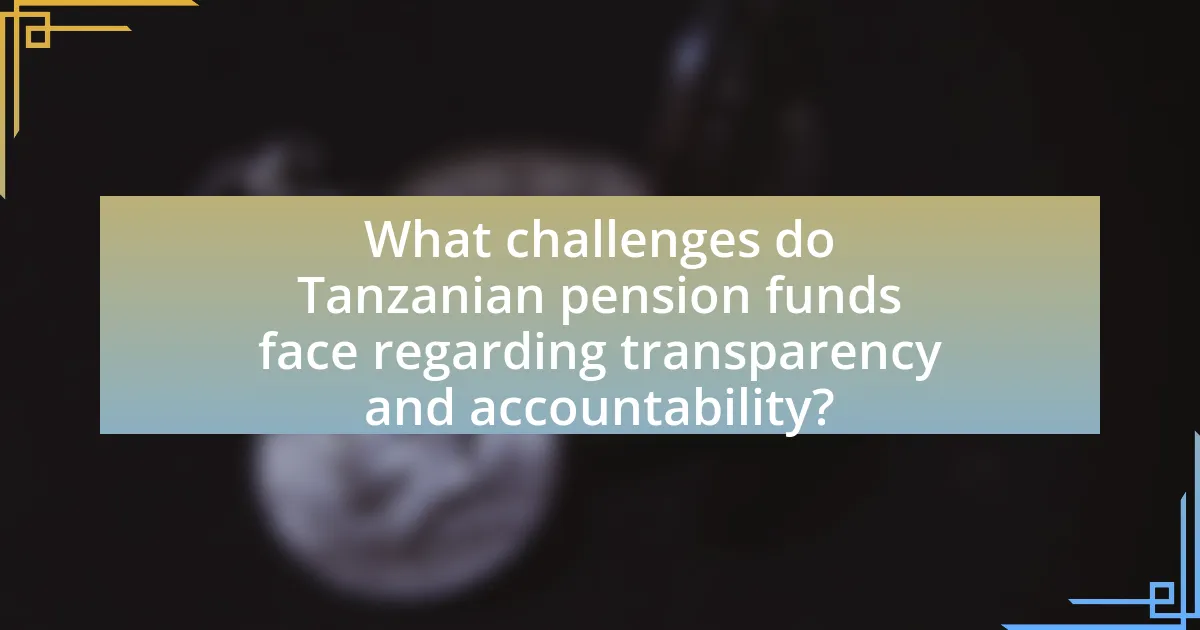
What challenges do Tanzanian pension funds face regarding transparency and accountability?
Tanzanian pension funds face significant challenges regarding transparency and accountability, primarily due to inadequate regulatory frameworks and limited access to information. The lack of stringent regulations allows for potential mismanagement of funds, as evidenced by reports indicating that many pension schemes do not adhere to best practices in governance. Additionally, beneficiaries often struggle to obtain clear information about fund performance and management practices, which undermines trust and accountability. A study by the International Labour Organization highlights that only 30% of pension fund members in Tanzania are aware of their rights and the operations of their funds, illustrating the transparency gap.
What are the common barriers to achieving transparency in pension funds?
Common barriers to achieving transparency in pension funds include regulatory challenges, lack of standardized reporting, and insufficient stakeholder engagement. Regulatory challenges arise from complex legal frameworks that may not mandate comprehensive disclosure, leading to inconsistent information. The absence of standardized reporting practices results in varied interpretations of data, making it difficult for stakeholders to assess fund performance accurately. Additionally, insufficient engagement with stakeholders, including beneficiaries and the public, limits the flow of information and feedback, further hindering transparency efforts. These barriers collectively contribute to a lack of trust and accountability in pension fund management.
How does lack of access to information hinder transparency?
Lack of access to information significantly hinders transparency by preventing stakeholders from obtaining critical data necessary for informed decision-making. In the context of Tanzanian pension funds, this lack of access can lead to obscured financial practices, making it difficult for beneficiaries to understand how their contributions are managed. For instance, a study by the International Monetary Fund in 2020 highlighted that limited information availability in pension systems often results in decreased public trust and accountability, as stakeholders cannot verify the integrity of fund management. This situation underscores the essential role of accessible information in fostering transparency and ensuring that pension funds operate in a manner that is accountable to their members.
What cultural factors affect accountability in pension fund management?
Cultural factors that affect accountability in pension fund management include societal norms, trust in institutions, and the level of stakeholder engagement. In Tanzania, for instance, a culture that emphasizes communal relationships can lead to expectations of transparency and ethical behavior from fund managers. Additionally, low trust in governmental and financial institutions can hinder accountability, as stakeholders may be skeptical of the management practices. Research indicates that cultural attitudes towards risk and financial literacy also play significant roles; communities with higher financial literacy tend to demand greater accountability from pension fund managers.
How can technology improve transparency and accountability in pension funds?
Technology can improve transparency and accountability in pension funds by enabling real-time data access and automated reporting systems. These advancements allow stakeholders, including members and regulators, to monitor fund performance and financial health continuously. For instance, blockchain technology can provide an immutable record of transactions, ensuring that all financial activities are traceable and verifiable. Additionally, data analytics tools can identify discrepancies and irregularities in fund management, promoting proactive governance. A study by the World Bank highlights that implementing digital platforms in pension fund management can enhance oversight and reduce fraud, thereby increasing trust among beneficiaries.
What digital tools are available to enhance transparency in pension fund reporting?
Digital tools available to enhance transparency in pension fund reporting include blockchain technology, data analytics platforms, and online reporting systems. Blockchain technology provides a secure and immutable ledger for transactions, ensuring that all fund activities are transparent and verifiable. Data analytics platforms enable pension funds to analyze and visualize data, making it easier for stakeholders to understand financial performance and risk factors. Online reporting systems facilitate real-time access to fund information, allowing beneficiaries and regulators to monitor fund activities and compliance. These tools collectively improve accountability and foster trust among stakeholders in the pension fund sector.
How can data analytics be used to promote accountability in pension fund operations?
Data analytics can promote accountability in pension fund operations by enabling real-time monitoring and reporting of fund performance and compliance. By utilizing data analytics tools, pension funds can track investment returns, assess risk exposure, and ensure adherence to regulatory requirements, thereby enhancing transparency. For instance, a study by the World Bank highlighted that data-driven insights can identify discrepancies in fund management, leading to improved governance practices. Furthermore, analytics can facilitate stakeholder engagement by providing accessible performance metrics, fostering trust among beneficiaries and regulators alike.
What best practices can be implemented to enhance transparency and accountability?
Implementing best practices such as regular audits, public reporting, and stakeholder engagement can significantly enhance transparency and accountability in Tanzanian pension funds. Regular audits ensure that financial statements are accurate and comply with regulations, thereby building trust among stakeholders. Public reporting of financial performance and operational activities allows beneficiaries to access critical information, fostering an environment of openness. Additionally, engaging stakeholders, including pension fund members and regulatory bodies, in decision-making processes promotes accountability and ensures that the funds are managed in the best interests of all parties involved. These practices are supported by the principles outlined in the International Organization of Pension Supervisors, which emphasizes the importance of transparency and accountability in pension fund management.
What role do stakeholders play in promoting transparency in pension funds?
Stakeholders play a crucial role in promoting transparency in pension funds by advocating for clear communication and accountability regarding fund management and performance. These stakeholders, which include government regulators, pension fund managers, beneficiaries, and civil society organizations, actively engage in monitoring fund activities and demanding access to relevant information. For instance, regulatory bodies enforce disclosure requirements that compel pension funds to provide detailed reports on their financial status and investment strategies, thereby enhancing transparency. Additionally, beneficiaries and advocacy groups often push for greater clarity on how funds are managed and invested, which can lead to improved governance practices. This collective pressure from stakeholders ensures that pension funds operate with a higher degree of openness, ultimately fostering trust and confidence among all parties involved.
How can regular audits improve accountability in pension fund management?
Regular audits enhance accountability in pension fund management by systematically evaluating financial practices and compliance with regulations. These audits provide an independent assessment of the fund’s operations, ensuring that funds are managed according to established guidelines and that financial statements accurately reflect the fund’s status. For instance, a study by the International Organization of Pension Supervisors highlights that regular audits can identify discrepancies and mismanagement, leading to corrective actions that uphold fiduciary responsibilities. This process not only deters fraudulent activities but also builds trust among stakeholders, as transparent reporting fosters confidence in the fund’s governance.
